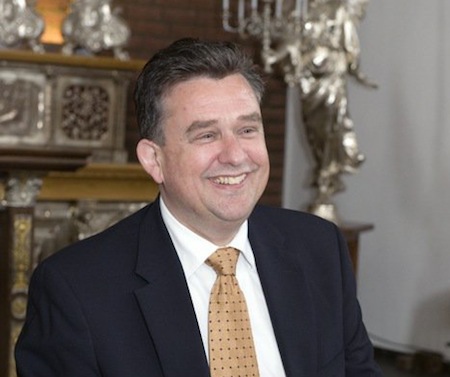Europeans, including the Dutch, may well be unplugged and disengaged this month.![]()
But ready or not, September 12 is nearly a month away, which means yet another European election — this time in the Netherlands, one of the six founding members of the European Economic Community in 1957, that body would develop into today’s European Union. Dutch voters will elect 150 members to the Tweede Kamer, the lower house of the parliament of the Netherlands.
And today, after years of elections on social issues, the Dutch parliamentary election is poised to be fought, won and lost on one issue: budget austerity and bringing Dutch fiscal policy in line with the European ideal.
Given what we’ve seen this year all across Europe — the success of Alexis Tsipras’s anti-austerity SYRIZA coalition in Greece, the emergence of the anti-austerity Victor Ponta in Romania and the surge of Jean-Luc Mélenchon’s Front de gauche in the first round of the French presidential election — it’s no surprise that the breakaway pace-setter in the Dutch election has been not any anti-Muslim group, but the Dutch Socialistische Partij (SP, the Socialist Party), led by Emile Roemer.
As I noted last week, the prior 2010 election saw unprecedented levels of fragmentation among the Dutch electorate, and it led to six months of talks before a governing coalition emerged — Mark Rutte and his free-market, liberal Volkspartij voor Vrijheid en Democratie (VVD, the People’s Party for Freedom and Democracy) ultimately formed a weak minority government in coalition with the once-strong, now-withering center-right Christen-Democratisch Appèl (CDA, Christian Democratic Appeal), with outside support on a vote-by-vote basis from Geert Wilders’s right-wing populist and anti-Muslim Partij voor de Vrijheid (PVV, the Party for Freedom). Rutte’s government fell in April when Wilders denied his support for a budget that would have reduced the Dutch budget deficit to just 3% of GDP next year.
In the current campaign, Wilders has attempted to deploy anti-Europe sentiment with as much gusto as he previously deployed anti-Muslim sentiment in 2010 (including wild rhetoric that would pull the Netherlands out of the eurozone). But according to the latest IPSOS poll, both Wilders’s PVV and the CDA are sinking. Even though Rutte’s VVD is holding steady as the top vote-winner, Roemer’s Socialists have vaunted into second-place — and are gaining. Currently, the Socialists are projected to take 29 seats to 35 seats for Rutte’s VVD. Other polls, moreover, give the Socialists a lead or put them in a tie with the VVD.
What does that mean? Even if the Socialists cannot form a coalition with, say, the longtime center-left Partij van de Arbeid (PvdA, Labour Party), which is currently polling in third place (projected to win 23 seats), the Socialists will nonetheless be a force to be reckoned with as never before.
And that means Emile Roemer will become a key power broker in Dutch — and European — politics.
So who is Roemer — and what can we expect from him?
Roemer remains a bit of a blank slate within the international media — for now, at least.
Roemer became the leader of the Dutch Socialists in 2010 after their shellacking in that election. For 15 years, Roemer was a schoolteacher in his hometown of Boxmeer, in the south of the Netherlands, and was only first elected to the Dutch parliament in 2006, in a wave that saw the Socialists reach a historical high of 25 seats — fully one-sixth of the lower house.
In 2012, however, the 49-year-old Roemer is aiming for an even better result.
He follows a previous leader in Agnes Kant, whose two years as leader were plagued by the party’s losses in the 2010 election. Kant, in turn, follows Jan Marijnissen, who had served as the party’s leader from 1994 until 2008 , who had a reputation for heavy-handedness, and who still casts a large shadow over the Socialists.
From Elsevier, a news weekly in the Netherlands:
Oud-partijleden en vrienden betwijfelen of SP-lijsttrekker Emile Roemer wel voldoende dossierkennis en diepgang heeft om premier van Nederland te worden als de SP de grootste partij wordt. Jan Marijnissen is een onaangenaam mens, maar hij weet alles. Bij Emile Roemer heb ik weleens het idee dat dit andersom is,’ zegt Sjaak van der Velden deze week in Elsevier. [Former party members and friends doubt whether SP party leader Emile Roemer features sufficient factual knowledge and depth to become the prime minister of the Netherlands if the SP becomes the largest party. “Marijnissen is an unpleasant man, but he knows everything. When Emile Roemer I sometimes feel that this it’s the opposite,” says Sjaak van der Velden this week in Elsevier.]
The Socialist Party began as a standard Marxist/Leninist Communist party in 1971, but ultimately mellowed into a standard leftist party by the 1990s, when it first emerged as a real electoral force in Dutch politics, winning nine seats in the 2002 and 2003 elections before its breakthrough in 2006.
Notably, the Socialists joined the far-right Wilders and his supporters, and supporters of the late Pim Fortuyn, in opposing the Dutch political establishment’s support of the 2005 referendum on the European Constitution — 61.5% of Dutch voters, as it turns out, agreed with them.
Roemer and the Socialists today don’t go so far as to say they are anti-Europe, but rather that they are opposed to the austerity measures sweeping across Europe in the wake of a sovereign debt crisis from which the Netherlands, a relatively wealthy northern European country, is not immune. Think of the Socialists of preferring a European Union that promotes growth, not a party that’s opposed to Dutch membership in the eurozone.
For now, it’s enough that Roemer has emerged as one of the election’s “big two” alongside Rutte — both realize the the election battle has yet to begin, and there’s a lot that can happen in Europe between now and late August.

One thought on “Who is Emile Roemer?”